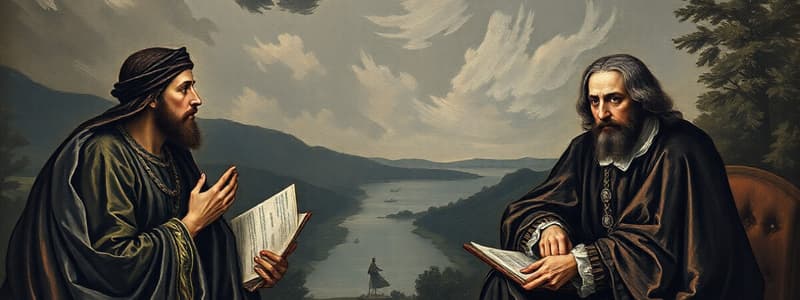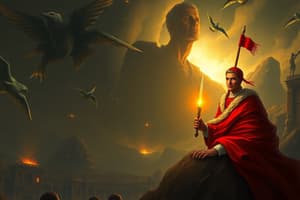Podcast
Questions and Answers
According to Machiavelli, what is the primary goal of a prince?
According to Machiavelli, what is the primary goal of a prince?
- To achieve happiness and fulfillment for themselves.
- To maintain and preserve their power. (correct)
- To promote the well-being of the republic above all else.
- To uphold justice and fairness for all citizens.
Machiavelli believes that fortuna, or chance, is a benevolent force that ultimately favors those who are virtuous.
Machiavelli believes that fortuna, or chance, is a benevolent force that ultimately favors those who are virtuous.
False (B)
What is the significance of Machiavelli's concept of 'fortuna'?
What is the significance of Machiavelli's concept of 'fortuna'?
Fortuna represents the unpredictable nature of fate and chance in Machiavelli's view. It emphasizes the need for a prince to be adaptable and capable of seizing opportunities while mitigating risks.
Machiavelli argues that a prince should rule with ______ rather than love.
Machiavelli argues that a prince should rule with ______ rather than love.
Match the following philosophers with their respective views on the ideal ruler:
Match the following philosophers with their respective views on the ideal ruler:
Which of the following best describes Machiavelli's view of reality?
Which of the following best describes Machiavelli's view of reality?
Machiavelli believes that a prince should strive to be a good and moral leader, even if it means sacrificing their own power.
Machiavelli believes that a prince should strive to be a good and moral leader, even if it means sacrificing their own power.
Explain why Machiavelli suggests that a prince needs to learn 'how not to be good' in order to succeed.
Explain why Machiavelli suggests that a prince needs to learn 'how not to be good' in order to succeed.
What is the primary purpose of the ontological argument?
What is the primary purpose of the ontological argument?
According to the ontological argument, the idea of perfection must originate from imperfect beings.
According to the ontological argument, the idea of perfection must originate from imperfect beings.
Who proposed the ontological argument as a way to prove the existence of God?
Who proposed the ontological argument as a way to prove the existence of God?
The concept of res ________ refers to the physical substance of reality.
The concept of res ________ refers to the physical substance of reality.
Match the following concepts with their descriptions:
Match the following concepts with their descriptions:
According to Machiavelli, which virtue is essential for a modern prince to hold onto power?
According to Machiavelli, which virtue is essential for a modern prince to hold onto power?
Descartes encourages looking to ancient philosophers for certainty.
Descartes encourages looking to ancient philosophers for certainty.
What is the first certainty that Descartes arrives at through doubt?
What is the first certainty that Descartes arrives at through doubt?
Machiavelli's portrayal of a politician is one who is _________ and _________.
Machiavelli's portrayal of a politician is one who is _________ and _________.
Match the following concepts with their correct definitions:
Match the following concepts with their correct definitions:
What does Descartes consider the ultimate source of certainty?
What does Descartes consider the ultimate source of certainty?
Machiavelli advocates for a traditional view of virtue in leadership.
Machiavelli advocates for a traditional view of virtue in leadership.
What skill does Machiavelli believe a modern prince must master?
What skill does Machiavelli believe a modern prince must master?
Descartes' work is considered the origin of the ________ method.
Descartes' work is considered the origin of the ________ method.
Which of the following is NOT one of Descartes' logical rules of inquiry?
Which of the following is NOT one of Descartes' logical rules of inquiry?
The goal of Descartes' method is to discover truths about oneself, the world, and God.
The goal of Descartes' method is to discover truths about oneself, the world, and God.
What does Machiavelli mean by a 'new kind of virtue' for a modern prince?
What does Machiavelli mean by a 'new kind of virtue' for a modern prince?
In his provisional code of morals, Descartes urges individuals to be ________ and ________ in their actions.
In his provisional code of morals, Descartes urges individuals to be ________ and ________ in their actions.
Match the following philosophers with their main ideas:
Match the following philosophers with their main ideas:
Flashcards
Ontological Proofs
Ontological Proofs
Proofs arguing for God's existence based on the concept of perfection.
Proof of Perfection
Proof of Perfection
Doubt implies imperfection; therefore, a perfect being (God) must exist to explain the idea of perfection.
Greatest Being
Greatest Being
The idea that God is the most perfect being, encompassing all goodness.
Res Cogitans
Res Cogitans
Signup and view all the flashcards
God as Truth
God as Truth
Signup and view all the flashcards
Machiavelli's Prince
Machiavelli's Prince
Signup and view all the flashcards
Fortuna
Fortuna
Signup and view all the flashcards
Reality vs. Idealism
Reality vs. Idealism
Signup and view all the flashcards
Power in Leadership
Power in Leadership
Signup and view all the flashcards
Machiavelli's Ethics
Machiavelli's Ethics
Signup and view all the flashcards
Fear vs. Love
Fear vs. Love
Signup and view all the flashcards
Teleological Ethics
Teleological Ethics
Signup and view all the flashcards
Control the Uncontrollable
Control the Uncontrollable
Signup and view all the flashcards
Machiavellian Virtue
Machiavellian Virtue
Signup and view all the flashcards
The Modern Prince
The Modern Prince
Signup and view all the flashcards
Descartes' Method
Descartes' Method
Signup and view all the flashcards
Provisional Code of Morals
Provisional Code of Morals
Signup and view all the flashcards
Cogito, ergo sum
Cogito, ergo sum
Signup and view all the flashcards
Methodological Doubt
Methodological Doubt
Signup and view all the flashcards
res extensa
res extensa
Signup and view all the flashcards
res infinita
res infinita
Signup and view all the flashcards
Scientific Method
Scientific Method
Signup and view all the flashcards
Logical Rules
Logical Rules
Signup and view all the flashcards
Existence of God
Existence of God
Signup and view all the flashcards
Change of Desire
Change of Desire
Signup and view all the flashcards
Unity of Mind and World
Unity of Mind and World
Signup and view all the flashcards
Study Notes
Machiavelli's The Prince
- Machiavelli's philosophy represents a departure from traditional political thought, focusing on practical, real-world governance rather than abstract ideals.
- Unlike Plato, who believed the philosopher-king should apply transcendent ideas, Machiavelli asserted that fortune (fortuna), an unpredictable force, shapes reality.
- Fortune is likened to a woman, unpredictable and potentially malicious. A ruler must understand and navigate this unpredictable force to maintain power.
- Machiavelli's ideal ruler focuses on acquiring and retaining power, seeing it as the ultimate goal.
- Employing "virtue" - involving prudence, cunning, and adaptability - the prince can manage fortune's unpredictable nature.
- Fear is deemed a more effective tool for leadership than love, especially in managing a populace.
Descartes' Discourse on Method
- Descartes aimed to establish a new approach to philosophy through his method, seeking certainty in knowledge through reason, not authority.
- His method rejected reliance on ancient texts, advocating self-reflection and doubt as initial steps.
- Emphasizing the importance of reason and logical deduction as tools for discerning truth.
- Descartes outlined a methodical approach:
- Never accepting anything as true without clear evidence
- Dividing complex problems into simpler components
- Conducting thoughts in a systematic manner
- Making exhaustive lists and verifying comprehensiveness.
- Descartes conceived reason as the power to objectively judge and distinguish truth from falsehood.
- Descartes' method provided a foundation for the modern scientific method.
Descartes' Provisional and Permanent Morals
- Descartes initiated a provisional code of morals to guide his actions while pursuing the method and avoiding inaction.
- Emphasized moderation and adhering to prevailing laws and customs.
- The importance of governing oneself using reasoned, moderate opinions.
Descartes' Proof of God's Existence
- Descartes' proof of God's existence emerges from his overall methodology.
- Through methodological doubt leading to self-awareness ("I think, therefore I am"), he establishes the existence of a thinking substance (res cogitans).
- He argues that the perfect concept of God must originate from a perfect being, thus proving God's existence.
- Having proved God's existence, Descartes establishes the certainty of the external world (res extensa).
Descartes' Conclusion and Methodology
- Descartes's method links the existence of the mind (res cogitans), God (res infinita), and the world (res extensa).
- The pursuit of truth requires the rigorous application of the method, including doubt as a catalyst for certainty.
Studying That Suits You
Use AI to generate personalized quizzes and flashcards to suit your learning preferences.




